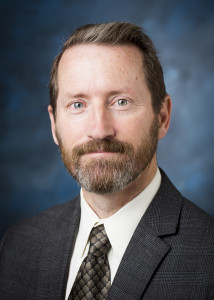As the fall semester moves toward its close, and faculty and students alike look forward to the holiday break from classes, I want to reflect a bit on the past semester and on ACTI’s role at LMU more generally.
The Academy of Catholic Thought and Imagination (ACTI) is an interdisciplinary community of scholars engaged in a wide variety of work related to the Catholic intellectual tradition, broadly conceived. As such, we were fortunate to receive last spring Pope Francis’s celebrated Encyclical, Laudato Si’, which has framed our activities this academic year.
Laudato Si’ engages science, economics, business, sociology, philosophy, and theology, among other disciplines, and therefore models precisely the sort of intellectual pursuits that animate ACTI’s mission. The Encyclical is, of course, a document steeped in the intellectual, spiritual, and social justice traditions of the Catholic Church; but it is a document addressed to “every person living on this planet,” and in the course of calling for more dialogue and, crucially, action on the issue of climate change, Pope Francis models the very sort of dialogue he calls for. Laudato Si’ ranges widely over many subjects and engaging many interlocutors: Encyclicals and Apostolic Exhortations of previous Popes; various Conferences of Bishops; the Catechism of the Catholic Church; a number of noted philosophers and theologians; United Nations documents; climate science; theological and spiritual thinkers from other religious traditions; and more. The Encyclical is a model for what ACTI hopes to become—a center that gathers together scholars and thinkers, Catholic and non-Catholic, who are interested in engaging topics of interest to the Catholic intellectual tradition in the course of engaging that tradition itself.
ACTI takes seriously its role as an intellectual hub or center of gravity at a Catholic university, which means taking seriously both “Catholic” and “university.” The former commitment means that ACTI is involved in work engaging various Catholic intellectual and artistic traditions as they are encountered in academic disciplines across the campus. At a Catholic university like LMU, the specificity of the Catholic intellectual tradition—past, present, and future—should be one of the focal points of intellectual work on campus. The latter commitment means that we conceive of “engagement” broadly. Catholicism has long held that faith and reason are mutually illuminating, and therefore rational discussion between people of good will is always to be welcomed. At ACTI, “engaging” the Catholic intellectual tradition means “taking it seriously.” Such engagement certainly includes the sorts of inquiry one traditionally associates with the Catholic intellectual tradition: apologetics, systematic theology, and Catholic philosophy. But at ACTI engagement also includes entering into dialogue with the Catholic intellectual tradition from the perspective of another faith tradition, or from no faith tradition; it includes expanding the Catholic intellectual tradition by engaging new phenomena and new realities—artistic, social, economic, scientific, and more; and it includes questioning and challenging Catholicism where it contradicts itself or falls short of what it claims to be, and when it comes into conflict with other traditions and other reasonable accounts. In short, ACTI is an interdisciplinary intellectual hub that is both inclusive and focused. It is focused insofar as it is encourages and supports intellectual and artistic work engaged with the Catholic intellectual tradition, as opposed to, say, a center focused on the history and development of some other political, social, or religious tradition. However, it is inclusive insofar as it welcomes scholars and artists of all backgrounds and interests, and encourages them to think of engagement with the Catholic intellectual tradition broadly an inclusively.
This year—again, taking our cue from Laudato Si’—our commitment to interdisciplinary engagement with the Catholic intellectual tradition focuses on issues stemming from our current environmental crises: the relationship between science and religion; the human place in the wider natural world; the science confirming climate change and the human role in driving it; the profound social justice implications of climate change and other crises that, driven largely by the consumption of the “global north,” disproportionately impact those in the “global south”; the relationship between climate change, politics, and capitalism; and, of course, the view of the Catholic Church on all these issues, especially as expressed in Laudato Si’ itself.
It’s been an exciting year, and there is more to come. I encourage you to take a look at our events this spring, to attend those that might interest you, and to help us spread the word to other interested members of the LMU community and beyond. We are hosting or sponsoring an amazing slate of events, many focused on our interest in Laudato Si’ (our trio of events featuring Dr. Jeremy Pal, Naomi Klein, and Fr. Sean McDonagh), but quite a few others as well (Emmanuel Falque, Fr. James Keenan, and others). Finally, and more immediately, I remind you of ACTI’s upcoming Christmas party, to which all faculty are invited. Come celebrate the holidays—all of them—with us, along with the end of the term, the scholarly achievements of the ACTI Fellows, and plain old collegial socializing. I hope to see you at one or more of these events, and look forward to working with colleagues across the campus on new foci and themes as we look forward to the 2016-2017 academic year.
Sincerely,
Brian Treanor
Charles S. Casassa Chair and Professor of Philosophy
Director, Academy for Catholic Thought and Imagination

